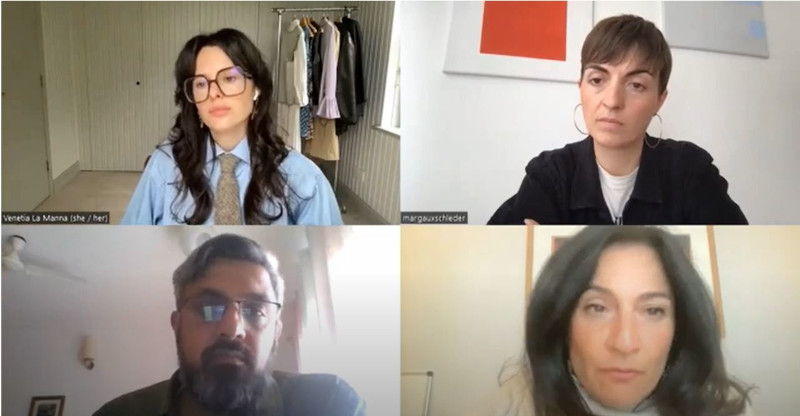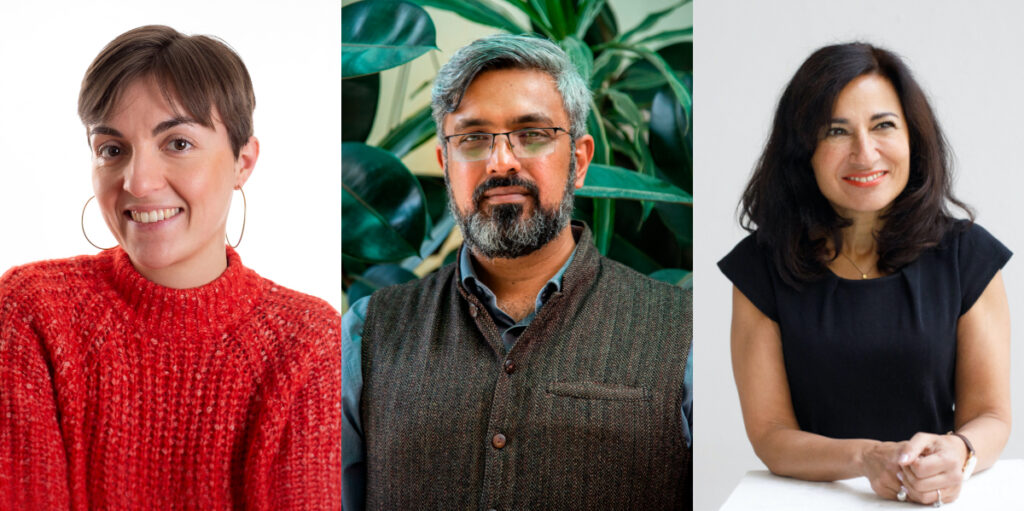Ten years after the Rana Plaza collapse, industry experts Margaux Schleder, Abhishek Jani and Safia Minney share their insights on how we can create a fairer future in fashion.
On 24 April 2013, the Rana Plaza building in Dhaka, Bangladesh, which housed five garment factories, collapsed. The disaster killed more than 1,100 people and injured more than 2,500, many of whom are still waiting for proper compensation.
Millions of people have since joined the Fashion Revolution campaign to demand a fairer, more transparent industry.

Safia Minney, founder of People Tree and executive director of Fashion Declares, spoke about the tragedy at a Sustainable Fashion Week webinar. She said that there had been ‘a sense that this was waiting to happen’. While Abhishek Jani, CEO of Fairtrade India, called the collapse a ‘huge wake up call even for people in the sector’.
Tackling the ‘fast fashion monster’
The speakers discussed how some safety conditions have improved since then and consumer awareness has been raised, but that, as Minney put it: ‘the [fast fashion] monster is out of control’, and workers’ rights are still at danger of being forgotten.
Host and fair fashion campaigner Venetia La Manna said: ‘One thing that is abundantly clear… is that garment workers need to be paid a fair living wage.’
Minney said: ‘I think anything other than a fair living wage is criminal… It’s unpolite. It should be Fairtrade or the semblance of decent trade should be what our system is built on.
‘We don’t have it because of lack of transparency, lack of accountability, vested interest, a sordidly dysfunctional system.’
The impact of Fairtrade
The impact of the textile industry extends right back to the farmers who produce the cotton sourced by brands. That’s why Fairtrade continues to call for full supply chain transparency.
Also speaking was Margaux Schleder, Head of CSR at Swedish fair fashion brand Dedicated, who said she had consciously chosen Fairtrade and organic cotton when starting her business: ‘I think Fairtrade is the most impactful label out there… It is the easiest thing for a brand to do.’
Jani added that environmental sustainability follows economic.
He said: ‘These are the key aspects of the Fairtrade model: working with smallholder farmers which allows them to have economic empowerment [which] allows them to then follow the better sustainability practices.’
Fairtrade is the most impactful label out there… It is the easiest thing for a brand to do.
Margaux Schleder, Head of CSR, Dedicated
Standing up for workers
As many as 100 million rural households depend on cotton for their livelihoods – but they also face rising costs of production, decreasing yields, the impact of climate change, and often being trapped in a complex supply chain.
Jani said that people – both consumers and in the industry – need to ‘listen’ to ‘those faceless, nameless people’ toiling in the fields and factories to make our clothes.
A hopeful future
Margaux was hopeful of a future for fairer fashion – especially with proposed EU legislation demanding living wages across the supply chain.
Safia declared: ‘Fair fashion is about relationship, partnership, love. It’s really appreciating the enormity of the natural resources and maximising the opportunities for decent livelihoods for everyone.’
- Watch the webinar on Fairtrade Germany’s YouTube channel.
- Find out more on the Fashion Revolution website.
- EU citizens can also sign the Good Clothes, Fair Pay petition.
Fashion and Fairtrade
Fairtrade cotton is produced by 20 producer organisations across eight countries, representing over 40,000 smallholder farmers.
We work with businesses to ensure cotton farmers are paid a Fairtrade Minimum Price for their cotton as well as a Fairtrade Premium to invest in their communities.
Where to buy Fairtrade cotton:
Choosing Fairtrade cotton makes a real difference to the people behind the label. Here are some of the brands we work with:
- People Tree
100% Fairtrade certified organic cotton clothing made to the highest ethical standards. - White Stuff
Committed to making Fairtrade Sourced Cotton an increasing part of their product range. - Thought
Timeless and accessible clothing with sustainability in mind since 1995. - Dip & Doze
Bed and bath products made using only the finest organic and Fairtrade-certified cotton. - Little Green Radicals
Colourful organic and Fairtrade clothes for children. - KoolSkools
UK-wide supplier of school uniform made with Fairtrade cotton.
